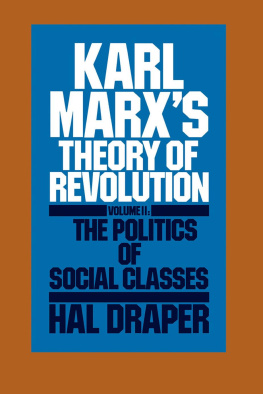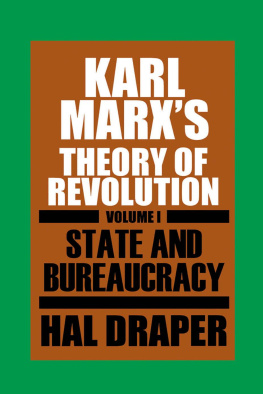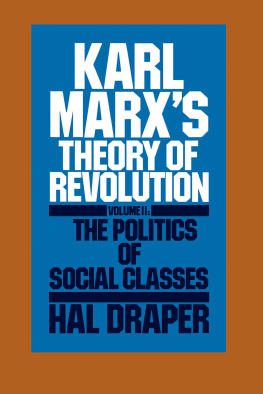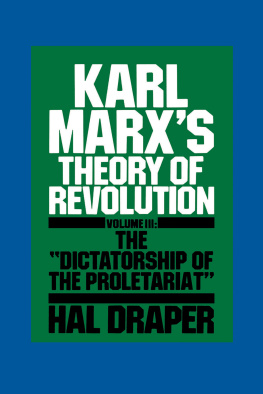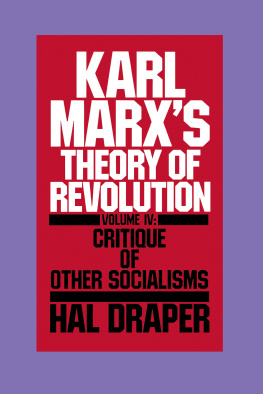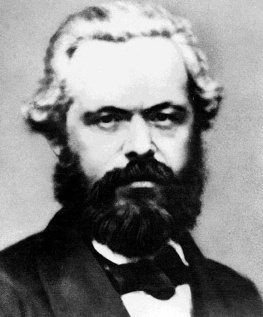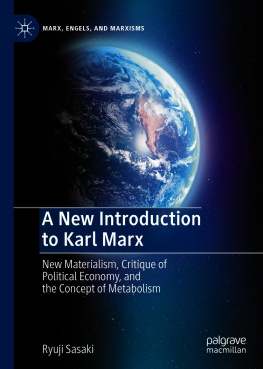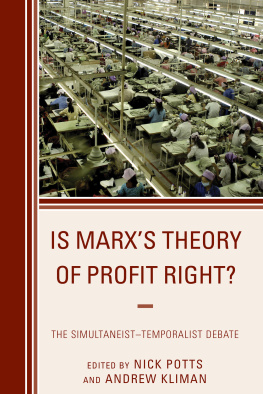Copyright 1978 by Hal Draper
All rights reserved
Library of Congress Cataloging in Publication Data
Draper, Hal.
Karl Marxs theory of revolution.
Includes bibliographies and index.
CONTENTS: 1. State and bureaucracy. 2. v. 2.
Politics and social classes. 1.Marx, Karl, 1818-1883Political scienceCollected works. 2. RevolutionsCollected works.
I. Title.
JC233.M299D7 301.592 76-40467
ISBN 0-85345-566-X
10 9 8 7 6 5 4 3 2 1
Manufactured in the United States of America
CONTENTS
Special Note A.
Marx on the Abolition of the Proletariat by Automation
Special Note B.
Marxs Conversation with Hamann
Special Note C.
Permanent Revolution: On the Origin of the Term
Special Note D.
Hair! or, Marxism and Pilosity
Special Note E.
The Address to the Communist League of March 1850
Special Note F.
The Alleged Theory of the Disappearance of the Middle Classes
Special Note G.
On the Origin of the Term Lumpenproletariat
Special Note H.
Two Adventures in Sophisticated Marxology
Special Note I.
The Weitling Myth: Horny-Handed Proletarian vs. Intellectual
Special Note J.
Marxs Course in April-May 1848
FOREWORD:
HOW NOT TO QUOTE MARX
The Foreword to Volume 1 took up a number of overall problems faced by any attempt to present Marxs views, particularly by an attempt at a full and definitive treatment of Marxs political thought. One of these problems can be usefully discussed again from another angle, taking inspiration from an article by Engels called How Not to Translate Marx.
I explained why this work has taken the route of presenting a large number of passages from Marx and Engels themselves, instead of merely offering the hundred-and-nth interpretation of their views, and I contrasted this method with quotation-mongering. Of course, quotation-mongering, being a pejorative, means any kind of quoting you dont like; but instead of pinning a definition to the mat, I offer a more positive contribution. What are the booby traps to look for in quoting from Marx and Engels?
The answer naturally applies in generalized form to anyone else. But nothing compares with marxology as the natural habitat of tendentious quotation. Ronald L. Meek put it mildly when he wrote: All too often, writers seem to assume that when dealing with Marx it is permissible to relax academic standards to a degree which they themselves would regard as quite illegitimate if they were dealing with any other economist. As usual, the main problem is not dishonesty. To be sure, there is a minor sector of the field, the gutter school of marxology, where anything goes; but this need not concern us here.
The main problem is what I would call, if pressed to invent a pseudoscientific nomenclature, Marxolalia. (Better, Marxophasia; but I prefer the sound of the first.) It may be defined as the propensity to garble Marx. The victim of this disorder cannot reproduce Marxs thought in a form that Marx would recognize. Of the many causes of this disorder, I want to concentrate on one that is remediable.
There are few writers or thinkers in history whose every word and grunt has been examined by hostile critics so minutely as Marxs has. This is quite in order, provided that the words and grunts are evaluated with ordinary common sense and decency. Marx came into the world to challenge all the established authorities, governmental authorities and intellectual authorities, and he can hardly complain if the authorities react with some hostility. They seize on the useful fact that every scrap of his correspondence has been published somewhere; unpublished as well as published manuscripts have been exhumed and reprinted; unfinished fragments have been solemnly published and annotated; workbooks and notes have been scoured; scraps of paper have been fished out of wastebaskets, as it were, and given to the world; volumes of real and alleged conversations have been put into circulation.
It may seem unnecessary to point out that all this material exists on several levels of reliability, and investigators who want to be trusted must always ask themselves what exactly they are quoting from. Yet hundreds of times, over and over, I have seen remarks by Marx that were hastily dashed off in a letter to a friend, or a few words jotted down in a note, solemnly quoted (without identification) as if they were long-pondered programmatic statements every syllable of which had been thought out for its exact scientific meaningindeed, even without regard to other statements on the subject of greater reliability. I wonder how many figures would come through such a working-over, done with a view to discreditment. In any case, several dozen interpretations of Marx can be fabricated, with little difficulty, through proper exegesis of the proper quotations thus wrenched off; and this has been going on industriously for a hundred years.
I repeat that I am not referring to garden-variety types of disingenuous or out-of-context quoting, but to a more elusive sort of Marxolalia. Thus, one sentence quoted from Marxs Grundrisse (economic workbooks) is just as quotable as any other sentence, isnt it? But the so-called Grundrisse is a peculiar nonbook: it consists of notebooks kept by Marx with no thought of publicationnotes and jottings toward the eventual writing of a work on political economy. Each sentence represents a thought that popped into Marxs mind at the timeunreviewed, unrevised, uncriticized, often ungrammatical, and sometimes undecipherable. If it turned out to be badly formulated, but quoters should remember them too.
I have just taken an important work as example, but all kinds of quoting operations are undertaken also on the most ephemeral sources.
Let us consider this systematically, by drawing up a list of the types of writings and documents by Marx or Engels that are used for quoting or quotation-mongering, in descending order of reliability. At the top of the list are naturally:
1. Books and major essays that were published under the control of the writer, with the usual opportunity for correction, revision, etc. (Most of Marxs or Engels major works will come to mind as examples.)
2. Articles published under the control of the writer.
a. Articles composed as political statements, for a political audience, and signed; in short, intended for the purpose they are used for.

